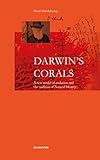Darwin's Corals : A New Model of Evolution and the Tradition of Natural History / Horst Bredekamp.
Material type: TextPublisher: Berlin ; Boston : De Gruyter, [2019]Copyright date: ©2019Description: 1 online resource (118 p.)Content type:
TextPublisher: Berlin ; Boston : De Gruyter, [2019]Copyright date: ©2019Description: 1 online resource (118 p.)Content type: - 9783110643343
- 9783110680317
- 576.82 23/ger
- online - DeGruyter
| Item type | Current library | Call number | URL | Status | Notes | Barcode | |
|---|---|---|---|---|---|---|---|
 eBook
eBook
|
Biblioteca "Angelicum" Pont. Univ. S.Tommaso d'Aquino Nuvola online | online - DeGruyter (Browse shelf(Opens below)) | Online access | Not for loan (Accesso limitato) | Accesso per gli utenti autorizzati / Access for authorized users | (dgr)9783110680317 |
Frontmatter -- Table of Contents -- Preface to the English Edition -- Preface(2005) -- I. The Find (1834) -- II. From tree to coral (1837) -- III. Strickland’s alternatives (1840) -- IV. From the circle drawings to the diagram (1851–1858) -- V. The fold-out diagram in the Origin of Species (1859) -- VI. Coral: Tradition and Encounter -- Conclusion: The lure of the “endless” -- Acknowledgements -- Bibliography -- Index -- Picture Credits
restricted access online access with authorization star
http://purl.org/coar/access_right/c_16ec
Bis heute wird Charles Darwins Theorie vom Überlebenskampf der Arten mit dem traditionellen „Baummodell" der Evolution visualisiert. Doch in Darwins Denken stellte früh die Koralle eine faszinierende Alternative zum Baum als Darstellung der Entwicklung der Species dar. Horst Bredekamp zeigt, wie der Korallenliebhaber und -sammler Darwin in ihr eine adäquatere Veranschaulichung der Evolution durch natürliche Selektion fand: Sie galt seit der Antike als Bild der gesamten Natur, wächst anarchisch in alle Richtungen und erhebt nicht mehr den Menschen zur Krönung der Entwicklung. Darwin erweist sich so im Modell der Koralle zugleich als Zerstörer und Vollender naturphilosophischen Denkens. Bitte beachten Sie die korrigierten Bildnachweise zur Printausgabe bei den Zusatzmaterialien.
To this day Charles Darwin’s evolutionary theory of the "survival of the fittest" has been visualized with the universal model of a tree of life. But early on in Darwin’s thinking the coral provided a fascinating alternative to the tree as a depiction of the evolution of the species. Horst Bredekamp shows how Darwin, a coral enthusiast and collector, found in it a more adequate illustration of evolution through natural selection: It grows anarchically in all directions and no longer upholds mankind as the "crown of creation." Using this example Darwin is proving himself to be both a destroyer and consummator of traditional natural philosophy. Since antiquity the coral had been a symbol of nature as a whole.
Mode of access: Internet via World Wide Web.
In English.
Description based on online resource; title from PDF title page (publisher's Web site, viewed 30. Aug 2021)


